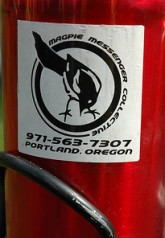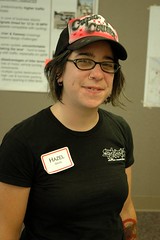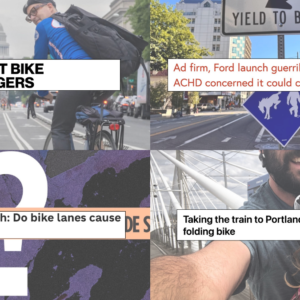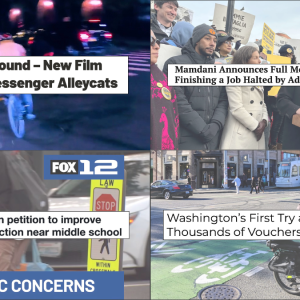[Note from Publisher: Welcome to the final installment of our three-part series on bike messengers in Portland. This series is written by BikePortland contributing writer Erin Greeson (bio).
In Part One, Greeson laid out the tough working conditions faced by Portland’s messengers. Part Two focused on health care and the negative stereotypes often associated with bicycle delivery professionals. Today, Greeson concludes her story by taking a look at attempts to organize and improve the industry.
Thanks to everyone for the vigorous discussion on this series thus far, and a special thanks to Erin Greeson for her work on this story.]
“By getting rid of commission-based pay, we see less haphazard riding.”
— Dee Branham, Magpie Messenger Collective
While some messengers might feel locked in unpromising circumstances, others have paired discontent with a desire to change things for the better.
When I spoke with veteran messenger Hazel Gross, she told the story of a past attempt by Portland messengers to unionize. Unfortunately the bike messengers’ goal was not realized, she explained, in large part because motor vehicle couriers employed by the same companies didn’t feel strongly enough about the issue to get involved ane the needed worker majority was not attained.
Others have established organizations that support the needs of the bike messenger workforce and community. For example, there is the Portland United Messenger Association (PUMA) and the Bike Messenger Emergency Fund, which grants flexible, $300 loans to messengers who sustain serious injuries on the job.
In addition to those organizations, some remarkable changes have emerged from within the system itself.
Dissatisfied with traditional bike messenger service business models, Ira Ryan and Dee Branham took matters into their own hands. In 2004 they formed Magpie Messenger Collective. Magpie revolutionized the traditional business model by reversing inherent structural flaws.
“No one is at the top, so everyone benefits equally,” Branham explained. “By getting rid of commission-based pay, we see less haphazard riding,” he said, “At Magpie, we ride slowly. Also, we don’t ride (brakeless) fixed-gear bikes,” Branham added.
“Magpie takes a unilateral approach,” said Meghan Mack, a current member of the collective. Hazel Gross also underscored the benefits of Magpie’s approach, saying that, “It is the only way to work efficiently.”
One long-term goal on the Magpie agenda is to secure heath insurance for employees. Meghan took the initiative to investigate group plans. She found that coverage through a group plan would make individual coverage affordable. She expressed optimism about the future possibility of health insurance for Magpie members.

Some messengers have applied their experience toward launching their own businesses. Ira Ryan established a successful hand-built bike enterprise. Hazel founded her own messenger service business. Other messengers have secured positions with companies that treat bike messengers well.
Gideon Telford works for Precision, an off-set printing and graphics company. “Precision treats staff bike messengers like other employees,” explained Telford, “we receive hourly pay and health coverage.”
In an economy and environment that demand updated definitions of “the bottom line,” messengers might find new opportunities. Many businesses base success on reputations for delivering high quality goods and services while compensating employees accordingly. For example, employees at New Seasons Market, the “friendliest store in town,” have good reason to be friendly: they receive health insurance and other benefits.
Meghan Mack, a messenger and a mom, optimistically pointed out that Portlanders take pride in supporting local businesses.
“If clients knew that a service rate increase was for the sake of establishing health insurance for workers, I think that businesses would accept it.”
— Meghan Mack
“Businesspeople are concerned about whether their service providers recycle, use green materials and so on, but they don’t always think to inquire about how employees are treated,” said Meghan. “I believe in the human race!” she said, with a smile to match her cascading platinum blond dreads. “If clients knew that a service rate increase was for the sake of establishing health insurance for workers, I think that businesses would accept it.”
As Portland moves toward the goal of becoming a low-carbon culture, bike messengers might be uniquely primed to capitalize on changing priorities. (A recent post by GreenTweet, a popular Twitter group that reaches over 1,000 followers nationwide, urged readers to consider the environmental benefits of bike messenger services.)
Also, messenger service business owners might revise old models to harness the potential of an increasingly sustainable and bike-centric economy. Success will require creativity and intelligence, revolutionary spirit and stamina — all of which are more than abundant in the Portland bike messenger community.
— Read Erin Greeson’s author bio and the first two parts of this series here.








Thanks for reading.
BikePortland has served this community with independent community journalism since 2005. We rely on subscriptions from readers like you to survive. Your financial support is vital in keeping this valuable resource alive and well.
Please subscribe today to strengthen and expand our work.
The risky behavior is, of course, dangerous, but it does speed up delivery times*, which either means happier customers or more deliveries per day, both of which help the bottom line… The question is, is the trade off worth it in terms of health risks, or not, or do you not have enough information to tell?
*Okay, slowing down to look for cross traffic and then running a red light when you need to go several blocks in that direction on a one way street downtown doesn’t actually speed up delivery time at all. However, there are things that are dangerous, (lower your standards for a safe speed and acceptable room when lane splitting, for instance,) that do speed up travel times…
Ira and Dee started Magpie Messenger?!? Do your research a little better.
Magpie isn’t looking for more people, are they? I could really use :^)
A JOB.
Dammit. Somehow my sentence got cut off.
stop trying there’s not enough work here. go to another city if your adamant
were not really any position to be hiring right now at magpie, and really, neither is anyone else in portland right now – theres enough experienced messengers in need of work to supply the industry for a while, barring some drastic economic upturn!
and justin is right – credit where credit is due, he and ira, with meghan helping out, started magpie. dee joined up a little on down the road from there. (correct me if im wrong, justin – thats how i remember the story going). i came along a little over 2 years into the game.
that factual error shouldnt reflect wholesale on erins research, though – in the end, who started magpie and when is incidental to the concepts involved.